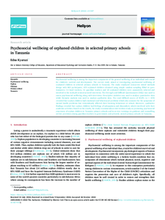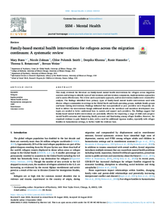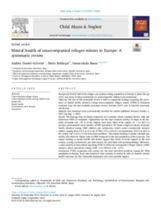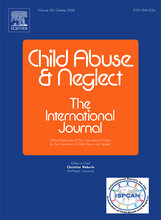Displaying 21 - 30 of 506
This Family for Every Child webinar focuses on the use of creative therapies in supporting the mental health of vulnerable children and youth.
This study aimed at investigating the psychosocial wellbeing of orphaned children in selected primary schools in Tanzania.
This global webinar addressed the need to give greater priority to adolescent mental health, globally, and particularly in low- and middle- income countries. Experts from RTI International, Plan International, Johns Hopkins University, and AstraZeneca share research findings and present new analysis of global data with the aim of motivating and guiding action to improve adolescent mental health.
Four Family for Every Child member organisations share their experiences and perspectives on supporting the mental health of vulnerable children, building on discussions from their last event:
This global study reviewed the literature on family-based mental health interventions for refugees across migration contexts and settings to identify types of interventions and intervention components, implementation approaches and to assess effectiveness. The review used a systematic approach, and ten intervention studies were retained for analysis.
The aim of this systematic review is both to summarize findings regarding the prevalence of mental health disorders among unaccompanied refugee minors (URM) in European countries since the last available systematic review (October 2017), and to describe associated risk factors.
The aim of this systematic review is both to summarize findings regarding the prevalence of mental health disorders among unaccompanied refugee minors (URM) in European countries since the last available systematic review (October 2017), and to describe associated risk factors.
In this video, Anne Kinuthia, shares how social work practitioners from Kivuli, a residential care service provider in Kenya, used a simple, fun, and non-threatening activity called My Say to help children, families and staff, surface and process their emotions during the organization’s transition.
In this webinar three members from the Family for Every Child alliance present how they support the mental health of vulnerable children they work with in their different contexts, sharing their programmes and methodologies and responding to questions from audience members.
Why is it so important to consider mental health and emotional well-being in child care and child protection? How can we address mental health needs in a non-clinical environment?





